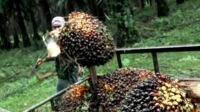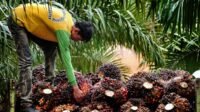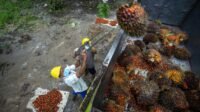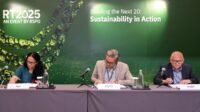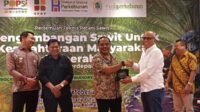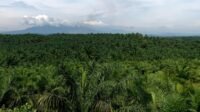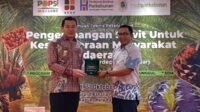PALMOILMAGAZINE, JAKARTA – Indonesia’s palm oil industry is in urgent need of comprehensive reform, according to the Ombudsman of the Republic of Indonesia (ORI). As part of long-term solution efforts, the Ombudsman is advocating for the establishment of a National Palm Oil Agency, a single coordinating body to manage the sector from upstream to downstream.
This proposal was put forward by Yeka Hendra Fatika, a member of the Ombudsman, during a closed-door policy discussion held at the National Development Planning Agency (Bappenas) office in Central Jakarta, on Wednesday, May 7, 2025.
“The key to fixing palm oil governance lies in coordination. The solution is clear: create a National Palm Oil Agency to unify and oversee all issues, from production to processing, under one roof,” Yeka stated during the panel.
The recommendation stems from a systemic study conducted by the Ombudsman last year. The investigation, which spanned six months and involved 52 institutions across various regions, uncovered deep-rooted structural and institutional issues impeding the industry’s performance.
Based on the findings, the Ombudsman outlined five major recommendations:
- Resolve land overlaps with forest areas.
- Overhaul the permitting and farmer data systems.
- Strengthen regulations for establishing palm oil mills.
- Organize trade mechanisms to ensure fair fresh fruit bunch (FFB) pricing for farmers.
- Form a National Palm Oil Agency reporting directly to the President.
“We submitted an official letter to the President two weeks ago as a follow-up to this proposal,” Yeka added.
Despite Indonesia being recognized as a global leader in palm oil downstream processing, Yeka stressed that significant problems persist in the upstream segment. “When it comes to downstream processing, Indonesia is the best in the world. But we still have a lot to fix in upstream,” he said, as quoted by Palmoilmagazine.com from the official Ombudsman site on Saturday (May 10, 2025).
The discussion, initiated by Bappenas, was officially opened by Minister for National Development Planning (PPN)/Head of Bappenas, Rachmat Pambudy. He highlighted the vital role of palm oil as a global strategic commodity that supports multiple sectors—from smallholder farmers to multinational industries.
“There’s no food product in the world that’s untouched by palm oil. It’s not only essential for our farmers and businesses, but for national and global needs,” Rachmat said.
Also present was Prof. Bungaran Saragih, Indonesia’s Minister of Agriculture from 2001 to 2004, who delivered the keynote speech. He emphasized the strategic importance of palm oil, noting it as the most successful sub-sector in Indonesian agriculture today. “Palm oil is the crown jewel of Indonesia’s agricultural sector,” Prof. Bungaran affirmed.
The proposal for a National Palm Oil Agency stands out as a strategic step to tackle governance challenges and secure the future of palm oil as a key driver of the national economy. (P2)








